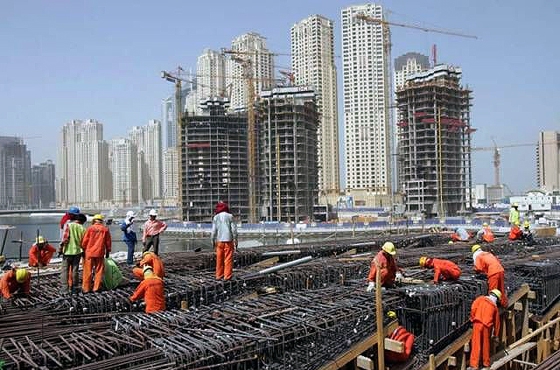Qatar's projects market is expected to be crowded even in 2016 as the country gears up preparations to host the FIFA World Cup in 2022, a new report has shown.
New contracts worth $30bn will be awarded in the country in 2016, Samba Financial Group said in its latest Qatar report.
Quoting Meed, the report said that Qatar was expected to be the "fastest-growing GCC projects market" in 2015, again with $30bn worth of new contracts to be awarded during the year.
About $135bn worth of contracts is due to be awarded in Qatar between 2015 and 2020. While elevated project activity will bring widespread opportunities, including for banks, Samba said there were worries about implementation constrains, given the vast amount of resources needed to undergo such projects.
According to Samba, the government's investment program would be one of the "key determinants" of economic performance over the medium-term.
Although there is evidence that the authorities have scaled down certain projects in the light of the sustained fall in the oil price, crucially Samba expects most of the planned investment will go ahead.
"The scale of investment relative to the size of the country, and the looming deadline of the 2022 World Cup, is challenging. But the authorities are well aware of the issues, including the risks of overheating, over-spending and poor yielding investments, and are looking to set up appropriate timelines and management processes," Samba said.
The report noted that Qatar would maintain the exchange rate peg to the dollar. Although there has been some muted pressure in the forwards markets, Samba fully expects the Qatari riyal to maintain its peg to the dollar.
"Its macro-fundamentals remain sound, external assets large, and there are few policy advantages from abandoning the peg, which has served Qatar well," the report noted.
On inflation, Samba said a "potential pressure point" in an economy experiencing rapid growth is inflation.
Qatar's inflation stood at 1.6% in July, up from 1.4% in June, thanks mainly to rising "housing, water and electricity" costs.
The CPI series was rebased to 2013 prices earlier this year, making construction of a consistent year-on-year (y-o-y) price change series unobtainable.
However, it is clear that the same dynamics remain in place that were evident through 2014 – elevated rental costs pushing up inflation, which is offset by falling international food prices.
"We expect these two opposing trends to continue, and even strengthen over the remainder of the year. We have already discussed the weak international commodity prices and China's sluggish performance.
"While in contrast, rapid population growth is creating inflationary pressures, most clearly illustrated in the real estate price index. Bringing these (somewhat divergent) strands together, we expect inflation to average under 2% this year with house prices being the main contributor," Samba said.
Gulf Times
27 September























































